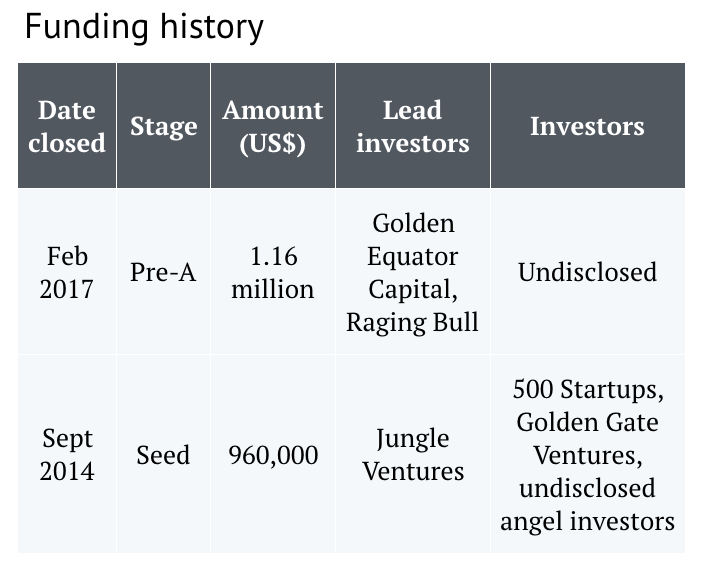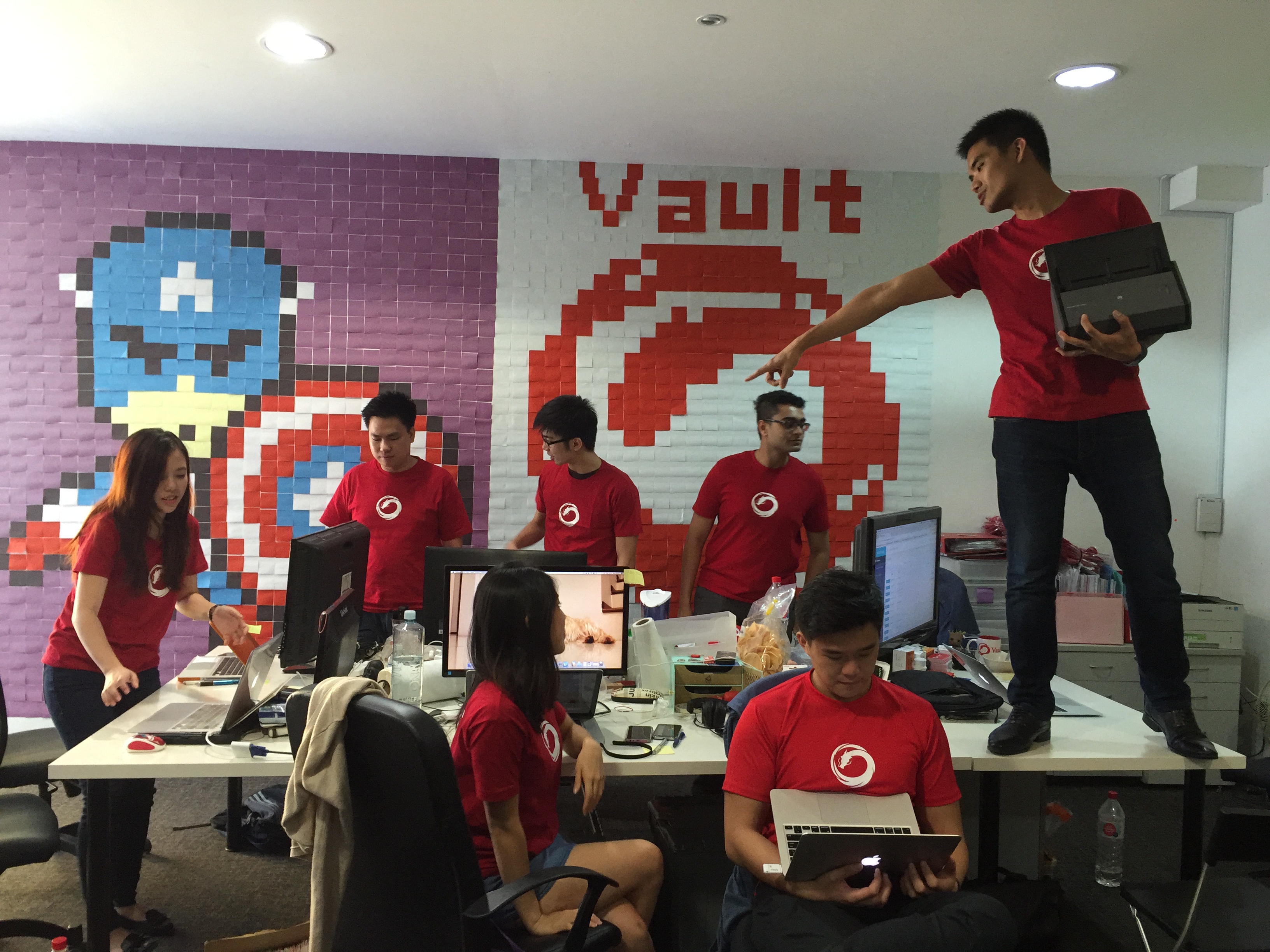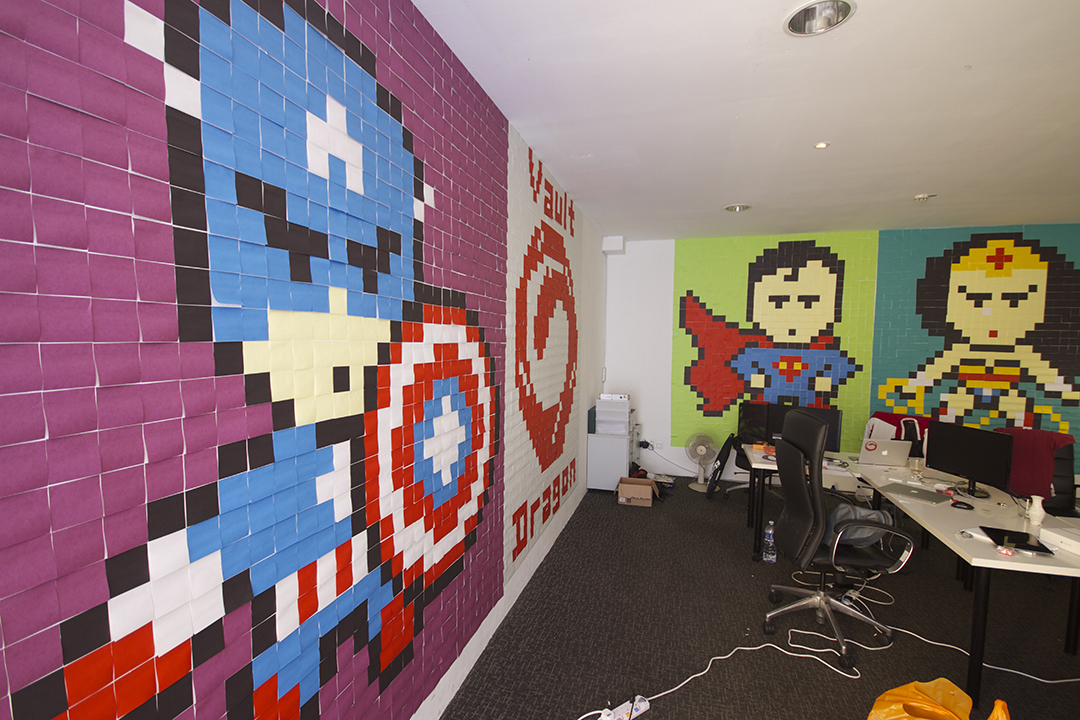
Ching (center, carrying pink rabbit) has gone through a lot.
A messy co-founder divorce. A drastic pivot. Nearly all employees quitting. And all of it happening at the same time.
While these would’ve killed most startups, Singapore-based Vault Dragon somehow survived. And it’s thriving.
The startup, which sells a software suite to help healthcare providers manage their operations better, claims it’s on track to make US$1 million in revenue this year, based on its current contracts with customers.
That’s more than double last year’s figure.
Investors are hopping on board too. It has just raised a pre-series A round, co-led by Golden Equator Capital and Raging Bull. Both are first-time investors in the company.
 Golden Equator is a private equity firm which has invested in noteworthy Singaporean startups like jobs site Glints and Tinder-clone-turned-social-entertainment-firm Paktor.
Golden Equator is a private equity firm which has invested in noteworthy Singaporean startups like jobs site Glints and Tinder-clone-turned-social-entertainment-firm Paktor.
Raging Bull is the investment vehicle of Ivan Lee, a superstar food entrepreneur who sold restaurant chain Thai Express for a tidy US$70 million. He’s invested in a bunch of other startups too.
Their involvement speaks volumes about Vault Dragon, although previous investors Jungle Ventures, Golden Gate Ventures, and 500 Startups didn’t join this round. But all three basically said the same thing: they declined to invest for reasons that had nothing to do with the company.
“The round is oversubscribed. We wanted to ensure the new investors have enough allocation as we already have a decent position in the company,” Amit Anand, managing partner of Jungle Ventures, tells Tech in Asia.
Nonetheless, Tseng Ching-Tse, the remaining founder of the company, says that angel investors from the previous round have re-upped.
He’s thankful to have gotten this far. “Everything somehow fell into place,” he says.
The pivot
I’ve met Ching three times prior to this interview. The first was more than three years ago, when he was a fresh-faced entrepreneur who left his boring consultancy job to join the JFDI accelerator program.
Vault Dragon had a simple pitch for simpler days: a Dropbox (or Uber, which is more fashionable now) for physical things. Place an order on an app, and someone will come to your location, put your items in the box, and store it in a warehouse.
It went quiet for a while. I bumped into Ching at startup events twice, and he put up a brave face. I had no clue what was going on behind the scenes.
After raising its first round in September 2014, Vault Dragon expanded into Hong Kong. Progress stalled. His business was too easy to copy, and within a month into his launch there, a swarm of Chinese competitors undercut the startup.
“It was quite tough because a lot of them actually raised more than us with Chinese money. Some of them just did downward integration from their warehouses. Some of them priced their services below cost. And they’re only focusing on Hong Kong. For us, We’re burning on both ends – Singapore and Hong Kong,” he says.

Ching got out. His next move: turn the business into one which was harder for competitors to get into. Vault Dragon became an electronic medical record (EMR) provider.
The thinking was that convincing doctors to adopt an EMR solution would be hard. Once they’re convinced, though, they’re loyal. Vault Dragon took six months to sign the first two doctors. Once word spread, the floodgates opened.
But it wasn’t as drastic a pivot as you’d think.
Vault Dragon separates itself from competitors like Practo by collecting a clinic’s medical records in boxes, and scanning them in a warehouse. Think of it as part of an onboarding process to get clinics started on using its software. As a result, its old infrastructure is still being used.
This benefits its customers because all their patients’ medical records will be digitized and instantly retrievable. No more paper records.
Assets frozen
Just when things were looking up, a second spanner was thrown in the works. Ching’s dispute with his co-founder rose to a boil. Ching declined to go on-the-record about the specifics, except to say that they didn’t see eye-to-eye on certain issues.
“We were both very young and pretty naive about how things should be,” he says.
The investors had no choice but to step in. They froze Vault Dragon’s assets, including the funding and the source code, as negotiations went on. Everything grinded to a halt. Staff were demoralized. Clients left.
The split was too much for employees to handle. Six staff tendered in six consecutive days. He eventually lost all of them – save for two.
It’s just a pity that we cannot dominate the market together.
Seeing them go hit him hard. “I failed my company, I failed my employees, I failed my investor. They put their faith in me to run a company, and I couldn’t live up to their expectations.”
Throughout the rough patch, Ching appreciated the support from the investors, especially Jeffrey Paine from Golden Gate Ventures, who took him out for coffee and encouraged him.
“I was really apologetic. I was trying my best, but I couldn’t guarantee that I could pull Vault Dragon through this,” he says.
Nonetheless, Jeff told him not to worry and just do his best.
Resurrection
Eventually, Ching could access the source code again, and co-founder Vishesh Mittal moved on to start a direct competitor, Plato Medical.
“He’s doing well, and I wish him well,” he muses. “It’s just a pity that we cannot dominate the market together.”
With no engineers on board, Ching was stuck with source code he knew nothing about.
Vault Dragon was near death; it was cut in half, frozen, and gutted. At least its brains were intact.
Gradually, Ching rebuilt his entire team, including the engineers. A sales team courted customers again.
These days, Vault Dragon’s numbers look promising. The company has onboarded over 60 clinics, medical chains, and multinational corporations. At least one customer has signed a six-year contract with him.
Last year, it had zero customer churn. In other words, no one stopped using it. It was profitable in seven of the 12 months, and employees got an extra half-day annual leave for each month they were in the black.
Its operating margin stands at 63 percent. 90 percent of its revenue now comes from its medical business, with the rest from personal storage (its initial focus), which it still runs but no longer advertises.

The Singapore government helped. Vault Dragon was vetted and approved as a tech partner of the Collaborative Industry Projects program. It means that the government subsidizes up to 70 percent of a business’s cost of adopting Vault Dragon.
Fundamentally, Vault Dragon promises a future in which a patient’s medical records can be seamlessly transferred from clinic to clinic (it’s exploring blockchain tech for that purpose). Patients can spot their health trends by comparing previous records. Data can be aggregated, anonymized, and analyzed to benefit Singapore’s entire healthcare system.
The government shares that vision; it has built its own database which allows healthcare providers to exchange patient data. Right now, transferring data from one clinic to another is a nightmare. You basically pay US$100 to print your records each time you want to pass it on to the next practitioner. “Admin fee,” quips Ching.
Radical transparency
The new investment round, with new investors, represents a fresh start for Vault Dragon and its revitalized team.
To prevent a repeat of old mistakes, which was caused by a lack of accountability within the company, Ching created a transparent culture.
Proper corporate governance was installed at last. Ching can no longer sign checks of any amount, nor does he hold the company bank account token anymore. All that is handled by the finance person.
They’ve also found a way to allocate costs properly. Because they run a delivery business, they handled a lot of petty cash like petrol costs, cash card top-ups, parking fees, and cash-on-delivery. It was all messy and they’ve created a process to manage that.
Ching has taken his startup beyond what most companies would do. Everyone’s salaries and commissions are disclosed within the company. Everyone has access to the company’s revenue and cost figures.
“Absolute power corrupts absolutely. Because I’m the solo founder now, a lot of times, I get blindsided by myself. It’s very important that if I ever step out of line, [the team has] to let me know.”
Converted from Singapore dollars. US$1 = S$1.42.
This post Despite founder split and losing almost all employees, Vault Dragon rises again appeared first on Tech in Asia.
from Tech in Asia https://www.techinasia.com/founder-split-losing-employees-vault-dragons-rising
via IFTTT
No comments:
Post a Comment